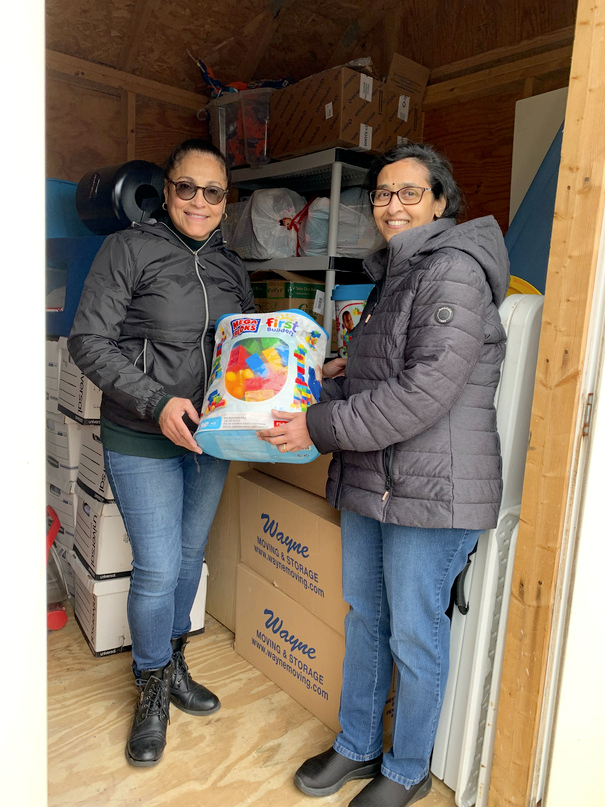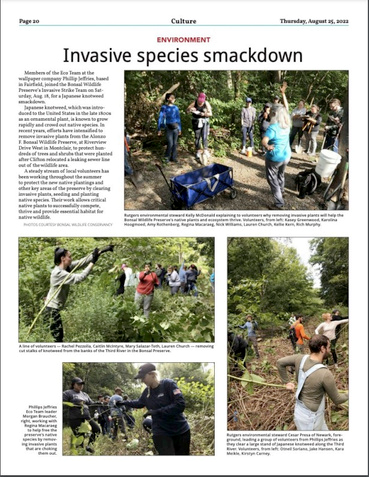Main Content
Michele Bakacs, Rutgers Cooperative Extension
(This article originally appeared in the December 2023 Gardener News)
Rutgers Cooperative Extension (RCE) has a wide range of volunteer programs whose common goal is to disseminate science-based information to the public. You may have heard about the Rutgers Master Gardeners and Rutgers New Jersey 4-H programs, as they are among the most established and widely known RCE volunteer programs.
Perhaps less well known is the Rutgers Environmental Stewards program, which teaches volunteers about the impacts of climate change and the important environmental issues affecting New Jersey. In turn, volunteers use what they learn from the program to help solve environmental problems in their own communities. Registration is open for the 2024 program which starts January 23rd.

Sudha Radhakrishnan, Rutgers Environmental Steward from Monroe worked on educating the public about recycling non-mandated materials.
In the next century, New Jersey’s climate is predicted to change dramatically as the northeast is warming faster than other regions of the country. These changes threaten coastal communities, infrastructure, vital ecosystems, biodiversity, wildlife, agriculture, public health, and the economy.
Amid New Jersey’s dense population and urban landscapes, there remain vital natural resources to protect. It is an ecologically diverse state with the highlands, ridge, and valley section to the north, and the Piedmont and coastal plain to the south. These different regions provide an incredible variety of habitats and native species, including 2,000 native plants, 62 land mammals, 85 freshwater fish, 480 birds, and 151 butterflies. More than 800 native plants are listed as endangered or a species of concern due to invasive species, habitat loss, and other factors.
New Jersey’s municipal land use law enables its 564 municipalities to plan and zone for development in their towns. The local zoning officer and the volunteer planning and zoning board members are responsible for interpreting the town’s master plan and ordinances. An important part of that process involves an informed and active citizenry participating in the municipal decisions that relate to protecting the land, air, water, and ecological integrity of our state.
The Rutgers Environmental Stewards program helps residents play such a role, as it fosters a network of volunteers and professionals who understand New Jersey’s ecology, land use principles, environmental regulations, and the mechanisms driving global and regional climate change. In addition to working with RCE to extend its research and outreach capacity, Environmental Stewards give back to their own communities and protect their local environment.

John Landau, Rutgers Environmental Steward from Morristown, teaching new Steward volunteers about habitat conservation and invasive species management at Foote’s Pond.
Starting each January, Stewards attend weekly online classes on topics taught by researchers from Rutgers, government, and the non-profit sector. The class runs for 17 weeks, with mostly online sessions and a few in-person meetings. This statewide program is divided into five geographic regions from which the class is administered, and participants from all counties are welcome. After each 2-hour lecture, classes break out into regions to meet with their coordinators for further discussion and activities. Each region holds several in-person classes, enabling participants to experience and address local issues. Optional field trips are offered to environmentally significant locations in New Jersey.
While the classes, field trips, and individual projects do not replace a science degree, the program provides stewards with a solid foundation of knowledge and confidence when presented with real-world environmental problems. After successfully completing the course, participants can complete a community-based volunteer project of their choosing to become a Certified Environmental Steward.
These projects enable Stewards to get hands-on experience working to solve environmental problems in their communities.
Since 2005, the program has trained more than 1,200 volunteers. Steward volunteers have completed 263 projects with over 50 partnership organizations including many helping to reduce the impact of climate change; engaged in 17,605 hours of environmental service across the state; contributed $595,739 in conservation value and impact to partnership projects; and enhanced or created 128 habitat sites through natural resource activities.
In 2023, 41 participants earned Environmental Steward certification following the completion of individual projects including:
- Bridgette Byrd from Roselle who worked on food waste reduction in Essex County schools and started the “Conscious Consumption Challenge”, a program that engages students in learning about sustainable practices and promotes positive behaviors in the cafeteria environment.
- Sudha Radhakrishnan from Monroe worked on educating the public about recycling non-mandated materials. She created a process to partner with companies like NexTrex, RecycleBalls.Org, and Second Chance Toys Partnership to collect 1,343 pounds of plastic film, 342 tennis balls, and 50 used plastic toys in her community.
- Christine Black from Browns Mills removed invasive plants and helped create 550 square feet of new pollinator habitat along Mirror Lake in Pemberton Township.
Stewards are typically excited about science and the natural world around them, want to engage with their local policy makers, and do their part to make a difference. Many go on to become members of their local environmental commissions, green teams, and planning boards. Registration for the 2024 Rutgers Environmental Stewards program is currently available at envirostewards.rutgers.edu/.

Kelly McDonald and Cesar Presa kickstarted a land restoration plan, combining their talent and dedication to a newly incorporated nonprofit, Bonsal Wildlife Preserve Conservancy, in Montclair.